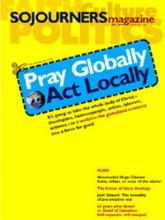Sister Begoña Plágaro was highly skeptical of left-leaning Venezuelan President Hugo Chávez. "I grew up in Spain under Franco," she says. "I know how dangerous it can be to mix political leadership with military leadership."
Sister Begoña, a religious sister of the Society of the Sacred Heart, has worked since 1991 in a barrio called El Estanque, one of the thousands of desperately poor "squatter neighborhoods" that surround Venezuelas capital city. Though uncertain about Chávez, Sister Begoña decided to take her chances with the poor. "They were the first to really understand the Chávez project," she says. If supporting Chávez was a mistake, she would rather err with the poor than against them.
Far from being alone, Sister Begoña is one of thousands of religious workers at the base in Venezuela who say the Chávez government is honoring the gospel mandate of a "preferential option for the poor" claimed by Catholic bishops at a 1968 meeting in Medellín, Colombia.
"With all its errors, Chávezs government is still trying to put into practice the words of the bishops," says Father Mario Grippo, a member of Charles de Foucaulds order of the Little Brothers of Jesus who has worked on a farming cooperative in the Venezuelan Andes for 28 years. "The bishops themselves are [now] denying what they wrote. But the people see that the government is moving toward the poor."
Read the Full Article

